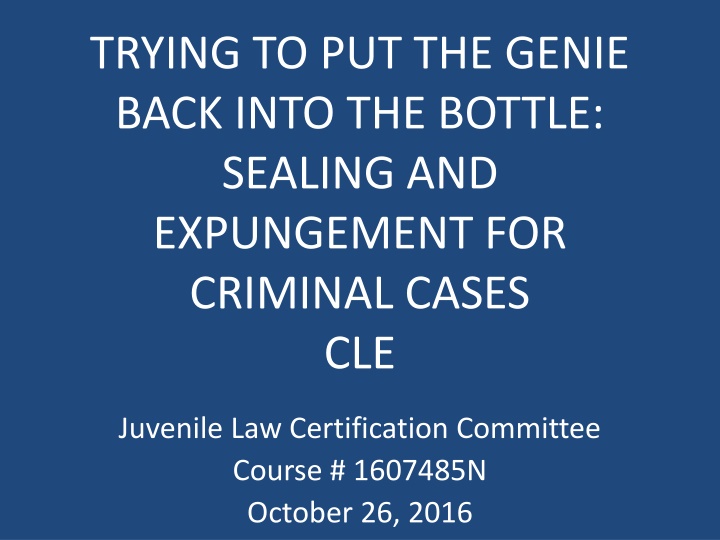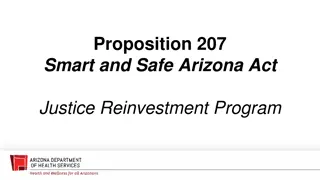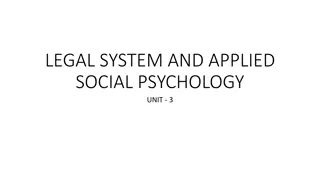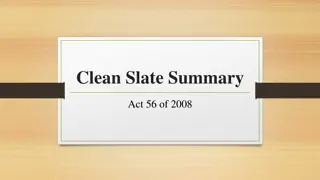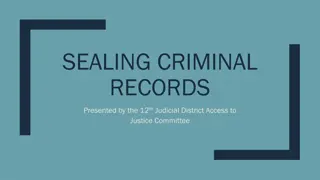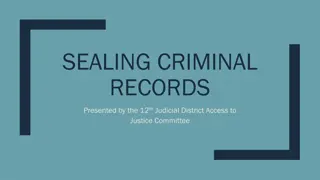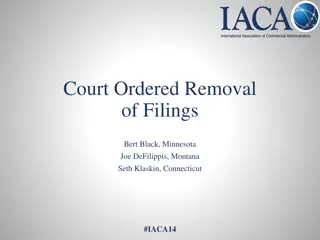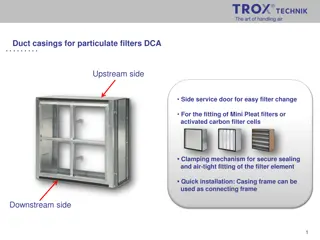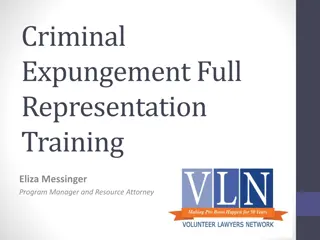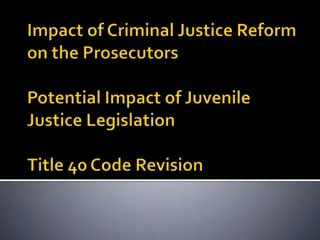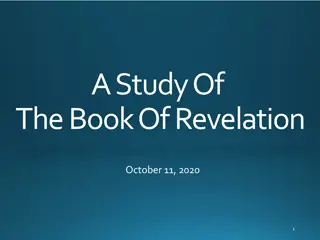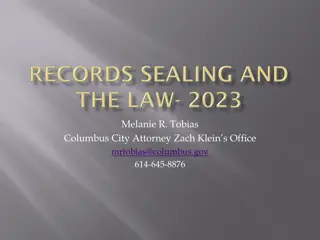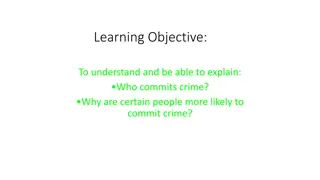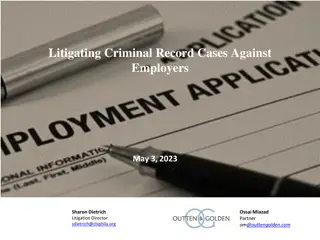Sealing and Expungement for Criminal Cases
Juvenile Law Certification Committee course material on the complexities of sealing and expungement for criminal cases, delving into policy choices, misconceptions, the process of sealing/expungement, relevant statutes, and the impact on criminal history records. The content emphasizes the nuances of providing a second chance to individuals with past criminal involvement while balancing public access to information and due process rights.
Download Presentation

Please find below an Image/Link to download the presentation.
The content on the website is provided AS IS for your information and personal use only. It may not be sold, licensed, or shared on other websites without obtaining consent from the author.If you encounter any issues during the download, it is possible that the publisher has removed the file from their server.
You are allowed to download the files provided on this website for personal or commercial use, subject to the condition that they are used lawfully. All files are the property of their respective owners.
The content on the website is provided AS IS for your information and personal use only. It may not be sold, licensed, or shared on other websites without obtaining consent from the author.
E N D
Presentation Transcript
TRYING TO PUT THE GENIE BACK INTO THE BOTTLE: SEALING AND EXPUNGEMENT FOR CRIMINAL CASES CLE Juvenile Law Certification Committee Course # 1607485N October 26, 2016
POLICY CHOICES: Open records v. a second chance However, we note that the policy of public access to hearings and trials is deeply routed in a Fourteenth Amendment concern for due process and a First Amendment concern for public access to ensure the proper operation of courts. By contrast, the policy of public access to old records must be weighed against the long-standing public policy of providing a second chance to criminal defendants who have not been adjudicated guilty. State v. D.H.W., 686 So. 2d 1331, 1336 (Fla. 1996)
People often think that diversion, dropping the charge, or withholding adjudication means there is no record. : FALSE The arrest report and resulting court records still exist. Even if the wrong person got arrested. The mere fact of the arrest often means being turned down for a job.
Approach to this sealing seminar The focus is on sealing/expungement of juvenile records, but that necessarily requires a lot of time on sealing or expungement generally. So, we will focus at first on the general sealing/expungement process. The PowerPoint is too detailed, on purpose, so it can be used as a reference.
Statutes, rules, regulations: Expunction: Fla. Stat. 943.0585; FAC 11C-7.006; Fla. R. Crim. P. 3.692 and 3.989 (sample Affidavit; Petition to Seal/Expunge; Order to Seal/Expunge). Sealing: Fla. Stat. 943.059; FAC 11C-7.007; Fla. R. Crim. P. 3.692 and 3.989. Fla. Stat. 943.0581: administrative expunction for arrest made by mistake. Fla. Stat. 943.0582: streamlined expunction for certain non-violent misdemeanors for juveniles only. Fla. Stat. 943.0583: human trafficking victim expunction.
Criminal history records are found in a lot of places: The arresting police agency tricky: a defendant might be arrested by the Clay County Sheriff s Office on a Duval County charge. Florida Department of Law Enforcement State Attorney s Office/Statewide Prosecutor s Office Florida Department of Corrections (sometimes) For juveniles, Department of Juvenile Justice and maybe Teen Courts. Salvation Army Probation Department DHSMV Clerk of the Court Protective Investigation Unit of the Department of Children and Families
What is a criminal justice agency? The sealing and expunction statute impacts records maintained by a criminal justice agency. This is defined under Fla. Stat. 943.045(11) to mean: a) A court b) FDLE c) The Department of Juvenile Justice d) The Protective Investigations component of the Department of Children and Families, which investigates the crimes of abuse and neglect e) Any other governmental agency or subunit thereof that performs the administration of criminal justice pursuant to a statute or rule of court and that allocates a substantial part of its annual budget to the administration of criminal justice (this should include State Attorney Offices and Offices of Statewide Prosecution) As foreshadowing, we will see that some statutes that deal with the confidentiality of juvenile records refer only to records maintained by the FDLE, rather than to records maintained through other agencies covered by this more broad definition of criminal justice agency.
Supposedly, they will all be notified of a sealing/expunction order: On the order itself, list State Attorney s Office, arresting agency (including the County Sheriff who runs the jail), and FDLE. Clerk of Court and arresting agency must send the order to all agencies known to have received the criminal history information. The FDLE must send the order to the FBI. Fla. Stat. 943.059(3)(b); 943.0585(3)(b) Makes sense to also list on the Order, if applicable: a) Department of Juvenile Justice b) Protective services component of DCF, which investigates crimes of abuse and neglect
Federal Bureau of Investigation The Florida Department of Law Enforcement shall forward the order to seal/expunge to the Federal Bureau of Investigation. 943.0585(3)(b), Fla. Stat. and 943.059(3)(b), Fla. Stat. But, does the FBI really have to comply with the state court order?
National Crime Information Center Public can t access.
Why its better to expunge than seal: Criminal justice agencies must physically destroy any expunged records. Criminal justice agencies can and will keep a notation that it complied with the order to expunge. Fla. Stat. 943.0585(4) Criminal justice agencies keep sealed records, but don t let the public see them. FDLE must keep the expunged criminal history record, but the criminal history record is exempt from Chapter 119.
Practice Pointer The FDLE is pretty helpful. The FDLE website has a lot of useful information, including a good Frequently Asked Questions section. www.fdle.state.fl.us The sealing/expunging issues (FDLE Legal: 850-410-7676; FDLE Seal/Expunge Department: 850-410-7870). FDLE lawyers are willing to talk about
Eligibility for Expunction (you really have to read Fla. Stat. 943.0585 closely): As an adult, never adjudicated guilty of any crime, anywhere. As a juvenile, never adjudicated delinquent of certain felonies or misdemeanors under F.S. 943.051(3) (This is a laundry list that includes all felonies and some misdemeanors; these offenses also require that a minor be fingerprinted.) The State dropped/dismissed the charges, or the court dismissed the charges. The case did not go to trial, even if an acquittal. Not adjudicated guilty of the charge you want to expunge. Never sealed or expunged a case previously in Florida. Finished your sentence, including probation of the charge you want to seal. Once a record has been sealed for 10 years, can petition to convert it to expunction.
Eligibility for sealing: All the same as for expungement. But, sealing is where the charges are not dropped or dismissed, but the applicant gets adjudication withheld. But, you cannot seal if you get withheld adjudication for a laundry list of offenses. See Fla. Stat. 943.059. One that probably comes up the most is domestic violence.
Key difference for eligibility: Expunge: State drops it or court dismisses it. Seal: Defendant pleads guilty or no contest and adjudication withheld. If convicted, can t seal or expunge.
Does a previous sealing/expunction in another state count as the one bite of the Florida apple? The law changed effective July 1, 2013. It used to be that the petitioner could not get a certificate of eligibility if she had previously sealed or expunged another case in another state. Now, you can still petition to expunge/seal a Florida case even if you have sealed/expunged another matter in another state.
A person may lawfully deny or fail to acknowledge sealed/expunged arrests. But, there are exceptions if the person: is a candidate for employment with a criminal justice agency; is a defendant in a criminal prosecution; concurrently or subsequently petitions to seal or expunge another matter; is a candidate for admission for The Florida Bar; is seeking to be employed or licensed by, or to contract with, the Department of Children and Families, the Division of Vocational Rehabilitation within the Department of Education, the Agency for Healthcare Administration, the Agency for Persons with Disabilities, the Department of Health, the Department of Elderly Affairs, or the Department of Juvenile Justice, or to be employed or used by such contractor or licensee in a sensitive position having direct contact with children, the disabled, or the elderly; is seeking to be employed or licensed by the Department of Education, any district school board, a university laboratory school,a charter school, a private or parochial school, or a local governmental entity that licenses childcare facilities; is seeking to be licensed by the Division of Insurance Agent and Agency Services within the Department of Financial Services; Is seeking to be appointed as a guardian pursuant to 744.3125, Fla. Stat. is attempting to purchase a firearm from a licensed importer, licensed manufacturer, or licensed dealer, and is subject to a criminal history check under state or federal law (sealing only); Is seeking to be licensed by the Bureau of License Issuance of the Division of Licensing within the Department of Agriculture and Consumer Services to carry a concealed weapon or concealed firearm (sealing only). Fla. Stat. 943.059(4); Fla. Stat. 943.0585(4)
There are some offenses the client cannot seal (Fla. Stat. 943.059) If the client pled guilty or no contest as an adult, or if as a juvenile the client was found delinquent or pled guilty or no contest, to any of the following: Illegal use of explosives. Sexual misconduct with a developmentally disabled person. Child abuse or aggravated child abuse. Sexual misconduct in a Department of Children and Family Services licensed mental health treatment facility. Abuse of an elderly person or disabled adult. Luring or enticing a minor into a structure, dwelling, or conveyance for other than a lawful purpose. Aircraft piracy. Kidnapping. Procuring a minor for prostitution (former 796.03). Homicide. Sexual battery and related offenses. Manslaughter. Lewd or lascivious offenses involving persons less than 16 years of age. Sexual battery. Voyeurism. Robbery. Schemes to defraud in violation of the Florida Communications Fraud Act. Car jacking. Lewd or lascivious offenses involving the elderly or disabled. Lewd or lascivious act involving a child under the age of 16. Use of a minor in a sexual performance. Sexual activity with a child 12 to 18 years of age by a person in familial or custodial authority. Chapter 839 offenses by public officers and employees. Providing obscene matters to minors. Burglary of a dwelling. Computer pornography; traveling to meet a minor. Stalking or aggravated stalking. Selling or buying of minors. Act of domestic violence as defined in Fla. Stat. 741.28. Drug trafficking (this is different than mere possession). Home invasion robbery. Sexual misconduct with mentally ill criminal defendants. Terrorism. Arson. Manufacturing any substances in violation of Chapter 893. Aggravated assault. Any offense which serves as a predicate for sexual predator or sexual offender registration. Aggravated battery.
But, be careful, because what counts is the final charge the person pled guilty or no contest to. Examples: Arrested for armed robbery, but receives withheld adjudication for grand theft. Arrested for sexual battery, but pleads guilty and receives withheld adjudication for simple misdemeanor battery. Arrested for lewd or lascivious battery, but pleads guilty and receives withheld adjudication for child neglect. And, if the client is arrested for a prohibited offense (e.g. sexual battery), but the prosecutor drops or the court dismisses the charge, the client is eligible for expunction.
Domestic violence arrests can be tricky. Domestic violence is assault, aggravated assault, battery, aggravated battery, sexual assault, sexual battery, stalking, aggravated stalking, kidnapping, false imprisonment, or any criminal offense resulting in physical injury or death of one family or household member by another family or household member. Fla. Stat. 741.28(2) Family or household member means spouses, former spouses, persons related by blood or marriage, persons who are presently residing together as if a family or have resided together in the past as if a family, and persons who are parents of a child in common regardless of whether they have been married. With the exceptions of persons who have a child in common, the family or household members must be currently residing or have in the past resided together in the same single dwelling unit. Fla. Stat. 741.28(3)
Some nuances with domestic violence: Client arrested for domestic battery, but pleads to simple battery (State does not allege domestic relationship) - FDLE still interprets this as sealing prohibited. Client arrested for domestic battery, but pleads to Jacksonville s Municipal Ordinance against fighting: FDLE will issue the certificate of eligibility.
What happens if the arrest report says domestic battery but its really not? e.g., boyfriend - girlfriend, but they don t live together. FDLE likely will deny certificate of eligibility.
FDLE will deny a certificate of eligibility if client tries to seal a prohibited offense. But, if FDLE is wrong, you can appeal.
How to overcome denial of certificate of eligibility Call an FDLE lawyer to discuss it (with an affidavit from your client, FDLE may issue the certificate of eligibility). File a Petition to Review Florida Department of Law Enforcement Denial of Application for Certificate of Eligibility to Seal, in the trial court. Since this probably won t happen to you, just call me.
The main difference between sealed and expunged is what information is available to a few entities: The public does not have access to sealed or expunged records.
Who gets to see sealed records? Fla. Stat. 943.059(4): The Defendant or her attorney. Criminal justice agencies for criminal justice purposes, including criminal history background checks for approval of firearm purchases or transfers. State court judges to help with case-related decision making. These entities, for licensing, access authorization, and employment purposes (that is, for background checks on people who want certain jobs or licenses): Criminal justice agencies The Florida Bar Department of Children and Families, the Division of Vocational Rehabilitation within the Department of Education, the Agency for Healthcare Administration, the Agency for Persons with Disabilities, the Department of Health, the Department of Elderly Affairs, or the Department of Juvenile Justice, for employment, contracting or licensing in a sensitive position having direct contact with children, the disabled or the elderly Department of Education, a district school board, a university laboratory school, a charter school, a private or parochial school, or a local government entity that licenses childcare facilities Seeking to be licensed by the Division of Insurance Agent and Agency Services within the Department of Financial Services Appointment as a guardian under Fla. Stat. 744.3125 Bureau of License Issuance of the Division of Licensing within the Department of Agriculture and Consumer Services to carry a concealed weapon or firearm
Access to expunged records Fla. Stat. 943.0585(4) Criminal justice agencies for criminal justice purposes. These entities, for licensing, access authorization, and employment purposes (that is, for background checks on people who want certain jobs or licenses): Criminal justice agencies The Florida Bar Department of Children and Families, the Division of Vocational Rehabilitation within the Department of Education, the Agency for Healthcare Administration, the Agency for Persons with Disabilities, the Department of Health, the Department of Elderly Affairs, or the Department of Juvenile Justice, for employment, contracting or licensing in a sensitive position having direct contact with children, the disabled or the elderly Department of Education, a district school board, a university laboratory school, a charter school, a private or parochial school, or a local government entity that licenses childcare facilities Division of Insurance Agent and Agency Services within the Department of Financial Services Appointment as a guardian under Fla. Stat. 744.3125 The FDLE website says these agencies would only receive the subject s demographic information and a caveat statement that the criminal history is expunged, but the agencies won t receive the details.
Bottom line: Florida Department of Law Enforcement always will maintain the criminal record, whether sealed or expunged.
Practice Pointer Keep copies of the case documents and orders to seal or expunge. Many times, clients need to provide case-related documents to prospective employers. Once they are expunged, you cannot get them. It s possible to file a motion to get access to sealed records, but it is a pain. Bottom line: keep the police reports and orders to seal or expunge, and send copies to your client at the end of the case.
Some Nuance (but dont worry about it) Judicial v. Non-Judicial records Under separation of powers, the courts have the power to administer the court system, so the legislature can t restrict the sealing/expunction of judicial records. State v. D.H.W., 686 So. 2d 1331, 1334 (Fla. 1996); Johnson v. State, 336 So. 2d 93 (Fla. 1976). But courts can seal/expunge non-judicial records only because the legislature says so. State v. D.H.W., Id. at 1335.
This Distinction is shown in the Law v. the Rules: Fla. Stat. 943.0585 and Fla. Stat. 943.059 note the court s authority over court records, and address sealing/expunction of non- judicial records. Fla. R. Crim. P. 3.692 and 3.989 address sealing/expunction of judicial records (and non-judicial).
Cline v. State, 37 So. 3d 327 (Fla. 5th DCA 2010) If you are interested, this case discusses the difference between sealing judicial and non- judicial records.
What this means practically? Nothing forget I mentioned it. Every application will meet the requirement for sealing/expunction of judicial and non- judicial records.
Hearings when the State objects Court rarely sets hearing if State doesn t object. If State objects, hearing will be set on normal criminal calendar. Rare for evidence to be presented, but it can (should?) be.
The Remedy is Discretionary This section does not confer any right to the sealing (expunction) of any criminal history record, and any requests for sealing (expunction) may be denied at the sole discretion of the court. Fla. Stat. 943.059; 943.0585
Abuse of Discretion Standard Anderson v. State, 692 So. 2d 250 (Fla. 3d DCA 1997). Defendant pled no contest to grand theft and aggravated stalking and had adjudication withheld after grabbing a former girlfriend s purse and running away. Trial court denied sealing because he had already received a break from the criminal justice system because he received a withhold of adjudication and early termination of probation. The 3rd DCA holds that was not a sound reason. It was a first offense and non-violent crime so withholding would be ordinary, and early termination of probation was a reason for, not against, sealing. (But note, now by statute can t seal aggravated stalking). Practice pointer: ...the exercise of discretion contemplates that the court will make its decision based on consideration of all the facts and circumstances, rather than deciding the petition solely on the nature of the charge Id. at 254.
Harman v. State, 12 So. 3d 898 (Fla. 2d DCA 2009) Defendant charged with murder by shooting of his wife. After a year, the State dropped the charge because the medical examiner couldn t determine whether it was homicide or suicide. Prosecutor opposed expunction because the State believed Defendant committed murder and the prosecutor talked about prior accusations of domestic violence by a former wife. The trial court denied the expungement because the charged offense was serious and because of the previous domestic violence offenses. 1st DCA reverses because the seriousness of the offense alone is insufficient, and there was no evidence to support the prior domestic accusations. Remanded to the trial court to reconsider.
Oymayan v. State, 765 So. 2d 812 (Fla. 1st DCA 2000) Defendant arrested once for separate drug offenses occurring over a month. State drops the charges after pretrial intervention. Trial court expunges only one offense because it believes that s all it can do by law. 1st DCA reverses. The expunction statute applies to one arrest or one incident. 1st DCA holds onearrest can relate to multiple offenses. - useful: often see an arrest for, e.g., a bad license tag and the defendant will have a warrant for bad checks.
Baker v. State, 53 So. 3d 1147 (Fla. 1st DCA 2011) Opinion does not state the arrest charge, but state declined to prosecute. No evidence was presented at the hearing. Trial court denied Petition to Expunge because the appellant worked at a car wash where he had contact with the public (obviously including children). Reversed and remanded for a new hearing, because improper to deny a petition based on facts that would apply to any person seeking relief, and here no evidence showed that appellant worked in a position of trust, had more contact with children than the average person, or had unsupervised contact with children.
VFD v. State, 19 So. 3d 1172 (Fla. 1st DCA 2009) The appellant is not a juvenile. His counsel skillfully moved the trial court to refer to him by his initials to protect anonymity on appeal, and the 1st DCA followed the trial court s lead, and even noted that in a footnote. Appellant was arrested for aggravated assault with a firearm for allegedly pulling a gun on an air conditioner repairman. The state declined to prosecute. At the hearing, the appellant began to testify but the court stopped the testimony and asked to hear from the state. Without evidence, the prosecutor proffered that VFD pointed a gun, that the gun was found, that VFD was belligerent with the police, that police reports showed VFD had fired a shot in self defense three months prior, and that the non-filed case could be used in the future under Williams Rule. Counsel for appellant then said he could present testimony that VFD did not pull a gun in the arrest case, and could present evidence that the previous gunshot was self-defense. The court did not ask to hear the testimony, and instead sealed, rather than expunged, the criminal history because law enforcement should have access to the records. The 1st DCA reversed and remanded for an evidentiary hearing. Denying a petition because the record might be useful for law enforcement in the future is not a proper exercise of discretion, because that reason is applicable in any case.
Fisher v. State, 20 So. 3d 1032 (Fla. 2d DCA 2009) Trial court summarily denied Petition to Expunge with order stating that expunction is at the discretion of the court. Reversed and remanded for a hearing because where a petitioner has complied with the requirements for expunction of judicial and non-judicial records, she is entitled to a hearing.
Light v. State, 80 So. 3d 414 (Fla. 1st DCA 2012) Because the trial court failed to hold an evidentiary hearing circumstances justifying denial, we reverse and remand for further proceedings. or state facts and
Shanks v. State, 82 So. 3d 1226 (Fla. 1st DCA 2012) Defendant pled no contest to possession of cocaine for withheld adjudication and drug offender probation. After his probation was terminated early, he petitioned to seal. The trial court erred in denying the petition to seal without a hearing, because a denial requires some good reason based on facts and circumstances of Mr. Shanks individual case. Reverse and remand; trial court could hold hearing and still deny.
Gotowala v. State, 162 So. 3d 33 (Fla. 4th DCA 2014) Opinion does not state the underlying charge. Trial court summarily denied the petition to seal, even though State in writing did not object. Here, the trial court s summary denial of the petition frustrates meaningful appellate review. On remand, the trial court must either conduct an evidentiary hearing on defendant s petition or provide a written reason as to why it is denying the petition.
Cole v. State, 941 So. 2d 549 (Fla. 1st DCA 2006) Defendant acquitted by jury of lewd or lascivious molestation. 1st DCA reverses court s denial of petition to seal where court does not give any factual basis for denying. Useful: the consideration of all the facts and circumstances standard. Interesting: you can t expunge a jury acquittal.
S.L.P. v. State, 949 So. 2d 1150 (Fla. 3d DCA 2007) Insufficient to deny sealing because public s interest to having access to criminal history outweighs defendant s interest in sealing her record.
Godoy v. State, 845 So. 2d 1016 (Fla. 3d DCA 2003) Withheld adjudication for voting fraud. Trial court denies sealing because, this type of crime goes to part of the constitutional system... 3rd DCA reverses because trial court must have focused only on the nature of the charge, rather than all the facts and circumstances.
Maxwell v. State, 185 So. 3d 702 (Fla. 4th DCA 2016) (petition for review denied, 2016 WL 3126562) Appellant went to trial and was convicted by a jury and sentenced to five years in prison. Evidence at trial was that appellant was hired as a caretaker for an elderly woman, would leave the victim unattended and tied to a bed, and gave the victim un-prescribed Ambien to induce sleep. The conviction was reversed because the appellate court found that the conduct, though possibly criminal, did not fit under the elderly abuse/neglect statute that she was charged with. When the appellant petitioned for expungement, the appellant was not present and her counsel offered no evidence, so the trial court had nothing to consider except the trial testimony. The trial court did not abuse discretion in denying expunction. The trial court gave acceptable reasons related to the specific facts/circumstances of the case to support the trial court s finding that the public should have a right to know about the arrest: the victim was a family friend; appellant was paid a lot for being a caretaker; the victim was mentally sharp but immobile due to a broken hip; and appellant tied the victim to a bed and gave un-prescribed Ambien. Also, the 4th DCA notes that this case went to trial, and that the expunction statute requires that none of the arrest charges result in a trial. A footnote explains that the FDLE initially denied a certificate of eligibility due to the trial, but the trial court granted a defense motion to require that the FDLE grant a certificate of eligibility. The 4th DCA notes that the FDLE was right because a certificate of eligibility to expunge should not be granted when there was a trial. 943.0585(2)(a)(2), Fla. Stat.
Hernandez v. State, 603 So. 2d 105 (Fla. 3d DCA 1992) Sealing proper where (1) defendant was a police officer, (2) lewd act against a child, (3) prosecution dropped because wasn t in child s best interest to testify, (4) court felt defendant should not be a public servant.
